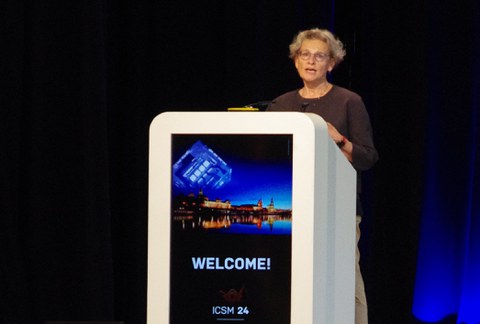Jul 12, 2024
Organic electronics: International experts from industry and research meet in Dresden

TUD Rektorin Prof. Ursula Staudinger eröffnete die Konferenz am 24. Juni 2024.
The 26th International Conference on Science and Technology of Synthetic Electronic Materials (ICSM 2024) was opened on 24 June 2024 in Dresden, Germany. For five days, more than 800 participants from academia and industry will discuss the latest advances in the production and use of organic solar cells and detectors, perovskite solar power collectors and other organic electronics.
Organic Electronics represents a dynamic and interdisciplinary field at the intersection of chemistry, physics, materials science, and engineering. Dresden, renowned for its strong research infrastructure and innovative ecosystem, has emerged as a hub for organic electronics research and technology, spearheading advancements in the field. Almost every smartphone and an increasing number of TV sets contain technologies developed by Novaled in Dresden – a spin-off by TUD - Dresden University of Technology. Another example are novel organic solar cells with ultralow carbon dioxide footprint that are produced in a worldwide unique mass production by Heliatek, another TUD’s spin-off.
The head behind all this is Prof. Karl Leo, Chair of Optoelectronics at TUD, successful entrepreneur, award-winning scientist and Chairperson of the ICSM 2024. "We are honored to host the 26th International Conference on Science and Technology of Synthetic Electronic Materials at TU Dresden," says Leo. "This event is a testament to the vibrant scientific community on organic electronics we have cultivated here. We look forward to the fruitful discussions and groundbreaking research that will emerge from this gathering."
ICSM 2024 will bring together around 800 participants from around the world, including researchers, industry professionals, and academic scholars. The conference will feature a diverse array of sessions, including plenary talks, technical presentations, and poster sessions, covering a wide spectrum of topics such as organic electronics, nanotechnology, and advanced material synthesis.
In her opening speech, the distinguished Rector of TU Dresden, Professor Ursula Staudinger, pointed out the importance of organic electronics research and industry in Saxony, where we have the OES – the Organic Electronics Saxony network. With more than 50 companies and research institutions, it represents the largest organics cluster worldwide.
Next to Prof. Staudinger, the honorary chair, Professor Klaus Müllen (Max-Planck-Institute for Polymer Research, Mainz) inaugurated the conference. “Professor Müllen’s is a globally renowned chemist and a pivotal figure in the field of synthetic electronic materials. His groundbreaking research and contributions have greatly advanced our understanding of organic semiconductors and graphene-based materials. His presence at ICSM 2024 underscores the conference’s reputation as a premier platform for knowledge exchange and collaboration among top-tier scientists and industry leaders”, explains Karl Leo.
About ICSM
ICSM is the longest-running conference series in the field of conducting and semiconducting organic materials. It started in the mid-1970’s with the advent of highly electrically conducting molecular crystals and conjugated polymers. The ICSM is recognized as the largest conference devoted to the field of organic electronics. It has been instrumental in showcasing many of the most important developments in the field over the last four decades. It has now become a premiere venue for discussion of the latest developments in the areas of organic electronics and photonics, from synthesis to characterization, computational modeling, device fabrication, and real-world applications. Over the years, ICSM has been hosted in various locations around the world, reflecting its international stature. The ICSM has been held at Siofok (1976), New York (1977), Dubrovnik (1978), Helsingor (1980), Boulder (1981), Les Arcs (1982), Abano Terme (1984), Kyoto (1986), Santa Fe (1988), Tubingen (1990), Göteborg (1992), Seoul (1994), Snowbird (1996), Montpellier (1998), Bad Gastein (2000), Shanghai (2002), Wollongong (2004), Dublin (2006), Porto de Galinhas (2008), Kyoto (2010), Atlanta (2012), Turku (2014), Guangzhou (2016), Busan (2018), and Glasgow (2022).
For more information about ICSM 2024, please visit
Media contact:
Prof. Karl Leo
Chair of Optoelectronics
Dresden University of Technology
Director DC IAPP
Email:
Tel: +49 351 463-34389
